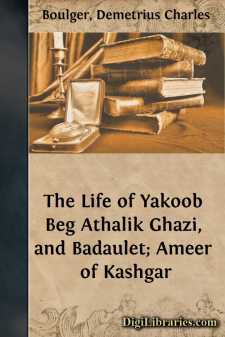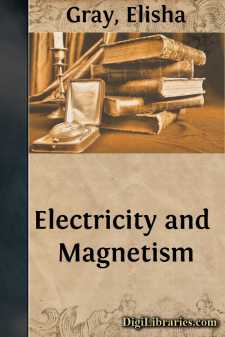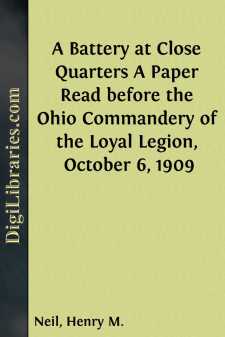Fiction
- Action & Adventure 180
- Biographical 15
- Christian 59
- Classics
- Coming of Age 5
- Contemporary Women 3
- Erotica 8
- Espionage/Intrigue 12
- Fairy Tales, Folklore & Mythology 236
- Family Life 169
- Fantasy 117
- Gay 1
- General 596
- Ghost 32
- Historical 808
- Horror 43
- Humorous 160
- Jewish 25
- Legal 4
- Medical 22
- Mystery & Detective 315
- Political 49
- Psychological 41
- Religious 64
- Romance 159
- Sagas 11
- Science Fiction 730
- Sea Stories 113
- Short Stories (single author) 537
- Sports 10
- Suspense 1
- Technological 8
- Thrillers 2
- Urban Life 31
- Visionary & Metaphysical 1
- War & Military 173
- Westerns 199
Classics Books
Sort by:
PREFACE. The following account of the life of Yakoob Beg was written with a twofold intention. In the first place, it attempts to trace the career of a soldier of fortune, who, without birth, power, or even any great amount of genius, constructed an independent rule in Central Asia, and maintained it against many adversaries during the space of twelve years. The name of the Athalik Ghazi became so well...
more...
DEAR PROFESSOR WHIRLWIND, Your name in the original German is too much for me; and this is the nearest I propose to get to it: but under the majestic image of pure wind marching in a movement wholly circular I seem to see, as in a vision, something of your mind. But the grand isolation of your thoughts leads you to express them in such words as are gratifying to yourself, and have an inconspicuous or...
more...
by:
Elisha Gray
CHAPTER I. THE AUTHOR'S DESIGN. The writer has spent much of his time for thirty-five years in the study of electricity and in inventing appliances for purposes of transmitting intelligence electrically between distant points, and is perhaps more familiar with the phenomena of electricity than with those of any other branch of physics; yet he finds it still the most difficult of all the natural...
more...
LIFE OF ISAAC T. HOPPER Isaac Tatem Hopper was born in Deptford Township, near Woodbury, West New-Jersey, in the year 1771, on the third day of December, which Quakers call the Twelfth Month. His grandfather belonged to that denomination of Christians, but forfeited membership in the Society by choosing a wife from another sect. His son Levi, the father of Isaac, always attended their meetings, but...
more...
Once upon a time a lion dropped his paw upon a mouse. “Please let me live!” begged the mouse, “and some day I will do as much for you.” “That is so funny,” roared the king of beasts, “that we will release you. We had no idea mice had a sense of humor.” And then, as you remember, the lion was caught in the net of the hunter, and struggled, and fought, and struck blindly, until his spirit...
more...
CHAPTER I The "Really, Truly" True WHEN "Little Women," the play, reopened to many readers the pages of "Little Women," the book, that delightful chronicle of family life, dramatist and producer learned from many unconscious sources the depth of Louisa M. Alcott's human appeal. Standing one night at the back of the theater as the audience was dispersing, they listened to...
more...
CHAPTER I. Who art thou, fair one, who usurp'st the place Of Blanch, the lady of the matchless grace?—LAMB. IT was towards the evening of a day in early April that two ladies were seated by the open windows of a cottage in Devonshire. The lawn before them was gay with evergreens, relieved by the first few flowers and fresh turf of the reviving spring; and at a distance, through an opening...
more...
by:
Henry M. Neil
During the Civil War artillery projectiles were divided as to structure into solid, hollow and case shot. The solid shot were intended to batter down walls or heavy obstructions. Hollow projectiles, called shell and shrapnel, were for use against animate objects; to set fire to buildings and destroy lighter obstructions. Under the head of case shot we had grape and canister. Grape shot is no longer...
more...
CHAPTER I Vulcan's Hammer The entire staff of the world-famed Spindrift Scientific Foundation gathered in the conference room of the big gray laboratory building on the southeast corner of Spindrift Island. It was unusual for the whole staff to be called to a meeting. Even more unusual—not a single member knew what the meeting was about. Rick Brant, son of the Spindrift Foundation's...
more...
A CRIMEAN NIGHT Lieutenant Sutch was the first of General Feversham's guests to reach Broad Place. He arrived about five o'clock on an afternoon of sunshine in mid June, and the old red-brick house, lodged on a southern slope of the Surrey hills, was glowing from a dark forest depth of pines with the warmth of a rare jewel. Lieutenant Sutch limped across the hall, where the portraits of the...
more...











